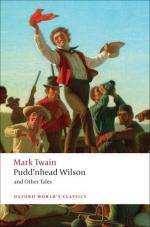TRAVELLING WITH A REFORMER
Last spring I went out to Chicago to see the Fair, and although I did not see it my trip was not wholly lost—there were compensations. In New York I was introduced to a Major in the regular army who said he was going to the Fair, and we agreed to go together. I had to go to Boston first, but that did not interfere; he said he would go along and put in the time. He was a handsome man and built like a gladiator. But his ways were gentle, and his speech was soft and persuasive. He was companionable, but exceedingly reposeful. Yes, and wholly destitute of the sense of humour. He was full of interest in everything that went on around him, but his serenity was indestructible; nothing disturbed him, nothing excited him.
But before the day was done I found that deep down in him somewhere he had a passion, quiet as he was—a passion for reforming petty public abuses. He stood for citizenship—it was his hobby. His idea was that every citizen of the republic ought to consider himself an unofficial policeman, and keep unsalaried watch and ward over the laws and their execution. He thought that the only effective way of preserving and protecting public rights was for each citizen to do his share in preventing or punishing such infringements of them as came under his personal notice.
It was a good scheme, but I thought it would keep a body in trouble all the time; it seemed to me that one would be always trying to get offending little officials discharged, and perhaps getting laughed at for all reward. But he said no, I had the wrong idea: that there was no occasion to get anybody discharged; that in fact you mustn’t get anybody discharged; that that would itself be a failure; no, one must reform the man—reform him and make him useful where he was.




